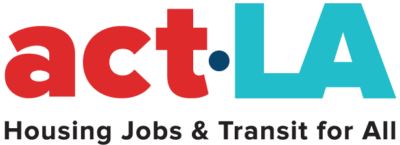Universal Fareless Transit
Background
The majority of LA Metro’s funding is provided from Propositions A and C, and Measures R and M local sales taxes. Our Metro is unique in that the majority of its funding has been committed by all Angelenos, as opposed to other metro agencies who depend on fare collections to fund transit. Through these sales taxes, all Los Angeles residents already pay for our public transit.
LA Metro has a yearly budget of $8 billion dollars, the majority of its funds coming from these county sales taxes. Of this, only 5% of funds comes from bus and train fare, from which Metro then spends nearly 90 cents of every dollar collected on policing its buses and trains, and fare collection staffing and operational costs.
View this post on Instagram
Opportunity for Change
Instead of adding to transit riders’ already burdensome cost of living and instead of maintaining an expensive fare collection and enforcement system, Metro should be universally and permanently fare-free for everyone.
By going fareless, Metro can cut out the expensive costs associated with fare enforcement, the TAP system, and the infrastructure and contracts required to collect fares. Fareless transit envisions the redirection of fare collection and enforcement funds into creating a transportation system that will be more accessible and just to its current riders (low-income, people of color, immigrant and youth riders) as well as attractive to future riders.
Universally fareless public transportation in Los Angeles county benefits all Angelenos. It provides crucial economic relief to Metro’s passengers, the vast majority of whom are very low-income, immigrant, people of color, and essential workers. The savings to families can be spent on rent, health care, education, better food options, and other investments in community members’ health and livelihoods, ultimately benefiting the entire regional economy. It will also grow transit ridership and aid Los Angeles in our fight for better air quality, climate solutions and less traffic congestion.
But by collecting fares on top of this public funding, Metro penalizes those who use the system — people who need it the most and earn the least — without yielding much for its riders… Whatever the challenges of a universal fareless system, there is no more efficient policy to simultaneously address the climate crisis, public safety and equity… Metro should be understood not as a business that delivers transit for a price, but as a public service that listens to, and invests in, community.
– “Here’s why L.A.’s Metro system should let everyone ride for free”, by ACT-LA Applied Research Specialist and ACLS Leading Edge Fellow Tala Oszkay Febres-Cordero, PhD
Our Vision
Universally fare-free public transportation on Metro is racial and economic justice. Public transit is the community infrastructure that connects us to jobs, school, healthcare and family. Investing in universal fareless transit is key to racial and economic justice for low-income Black, Latinx, immigrant and youth who make up Metro’s ridership and depend on Metro for transportation. It will also grow transit ridership and aid Los Angeles in our fight for better air quality, climate solutions and less traffic congestion.
Resources
The benefits of universal fareless transit (One-page flyer) (En Español)
Universal fareless transit is economic justice (One-page flyer)
How do we fund universal fareless transit? (One-page flyer)
– May 2023
Read the Strategic Actions for a Just Economy (SAJE) and ACT-LA report “The Road to Equity: The Case for Universal Fareless Transit in Los Angeles” (May 2023)
Envisioning a universal fareless Metro – one page flyer. (December 2021)
Updates
Multi-organization letter of support on universal fareless transit to LA Metro (July 27, 2023)
Our letter to Metro with concerns about fare capping and fare changes (November 30, 2022)
Read our comment letter to Metro to push for a continuation of pandemic safety precautions such as fareless buses (January 10, 2022)
Read our comment letter to Metro in support of universal fareless transit. (September 22, 2021).
Read our comment letter to Metro with bus rider testimonies attached urging Metro to continue fareless buses amid the COVID-19 pandemic and its continuing economic fallout (May 2021)
